Fight Like a Girl
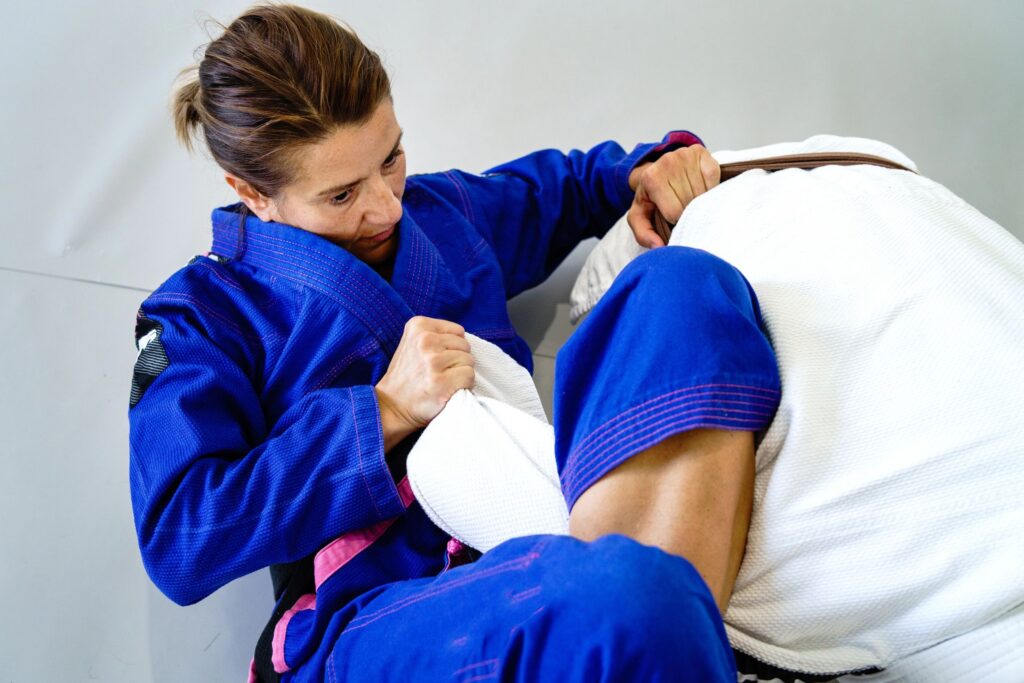
by Evelyn Sutton
The Future of BJJ is Fierce & Female
Jiujiteiras are cut from a different cloth than your average woman. Nothing wrong with average. We just like to be on top, preferably firmly mounted on our opponent and in control of our own well-being. Anyone who trains will tell you that Jiu-Jitsu is hard. And it can be even harder for women. Harder because it’s still a male dominated sport. Being a female in the Y chromosome world of Brazilian Jiu-Jitsu can get tough at times with women in BJJ classes outnumbered ten to one. Not because it’s not accessible to us, but because there aren’t enough of us actively training to even the odds.
The truth is, Jiu-Jitsu saves lives. Particularly the lives of women. Statistically, women are 10 times more likely than men to be the victim of a violent crime that can result in death. This poses the question: why aren’t then women flocking to gyms everywhere to learn BJJ? As a Jiujiteira myself, I want to do something to change that.
Perhaps it’s a case of not knowing. Not knowing the benefits of this practice, the growing number of gyms that offer women-only classes, the many competitive opportunities available and the very exciting movement that is currently happening in BJJ. There’s a strong, vibrant, beautiful and thriving community of women who are kicking ass, re-inventing the world of Brazilian Jiu-Jitsu and making a name for themselves in this sport. Flaunting their shining crowns in pure audacity, these queens are taking over the tatami and destroying stereotypes in an orchestrated display of talent, passion, athleticism, ferocity and grace that only we can pull off. Little caterpillars transforming into gorgeous—and lethal— butterflies.
On the mats there is no gender. Jiu-Jitsu is for anyone and everyone — gender makes absolutely no difference in someone’s ability to learn and effectively use BJJ. Designed for weaker and smaller opponents to dominate larger ones using technique over strength, BJJ is the great equalizer. It creates an even foundation for anybody to beat anybody. A 120lb woman who is a blue belt can easily submit a 200lb athletic man who is untrained or new to BJJ. A practice that challenges mental and physical limits, triggers fears, traumas, and repressed memories while forcing you completely out of your comfort zone. Jiu-Jitsu can take you from being a potential victim to the one in control. BJJ’s most important lesson is that it teaches us to take back our power. And women are fast learners.
Reasons We Train
Women train Jiu-Jitsu for sport, for fitness, for stress-relief, for the mental and physical challenge, for self-defense, for confidence and sometimes just because there’s nothing quite as fun as submitting someone bigger and stronger than you, over and over again.
Regardless of the reasons we train, most of us find Jiu-Jitsu because of someone in our lives; a friend, spouse, partner, father, coach or even child, encourages us to give it a try. Men have often played a huge part in helping the growth of females in BJJ, recognizing the value this art has in keeping us healthy and safe and we are grateful for our male supporters.
Women Enter the Arena
The queens of the tatami haven’t been around for long. It was only 32 years ago, in 1985, that women were allowed to compete in Brazilian Jiu-Jitsu — for the first time ever — at the Rio de Janeiro federation thanks to Yvone Duarte, our first female black belt.
A decade later, women get to compete at tournaments, when IBJJF (International Brazilian Jiu-Jitsu Federation) adds two female weight divisions, which combined all belt levels. There simply weren’t enough female competitors at the time to fill out a weight division. This is a major win and opens the door for more women to compete in the sport.
According to IBJJF, adding two additional weight classes — rooster and super heavy weight — in 2015 also contributed to the growth of female competitors. Other possible reasons for the boost were changes to training environments, making them more female-friendly, and rules that emphasized safety on the mat. Today with the consistent increase of female competitors (up to 10% a year), more weight and belt divisions are available with blue and white belts making up the largest divisions.
Organizations like Fight 2 Win, have also been doing their part to support women in Jiu-Jitsu. In 2016, F2W Pro made history by putting together the first ever female main event in professional Jiu-Jitsu, featuring Mackenzie Dern vs Rossie Snow. Dern defeats Snow in less than 14 seconds with an armlock, and proves to the world that BJJ girls can put on a show just as exciting as the boys can. F2W Pro is currently the only organization offering women the opportunity to headline a BJJ event.
You have a tribe
Most co-ed classes will be dominated by men who are bigger, stronger and heavier than you. Do yourself a favor and find women’s only-classes and open-mats in your area, especially if this is your first time. Carlson Gracie Jiu-Jitsu Team in Melbourne, Florida, hosts weekly women’s only classes with an average of 15 women per class motivating and encouraging each other to learn. Attending female BJJ classes can be beneficial whether it’s your first time training or you’re a seasoned Jiujiteira who rolls with the big guys all the time.
Don’t get me wrong, co-ed classes are extremely important. Statistically, you’re more likely to be physically assaulted by a man rather than a woman. With that being said, when it comes to training, whenever you have an opportunity to train in an environment with more women, take it. With better balance in weight and strength, there are many more techniques you can attempt. You’ll learn more and have tons of fun.
BJJ is such an intense and intimate sport on its own but consistently being the only woman in the room can make it even more challenging. There’s a shared understanding of that and community among the women in Jiu-Jitsu to support one another through the wins and losses, and to help navigate training when female specific questions come up about hair, nails, bruises, makeup, periods and motherhood on the mat, just to mention a few.
Female Inclusion in Jiu-Jitsu
The face of Brazilian Jiu-Jitsu is quickly changing as more women participate in the sport and prove that we can be badass competitors, coaches, and ambassadors. Every year, more females are reaching black belt rank in Jiu-Jitsu all over the world. In international competitions such as World Championships, there are women-only instructional camps and other special events with non-profit organizations that help bring awareness to the topic of violence against women and what we can do about it.
Statistically, women are 10 times more likely than men to be the victim of a violent crime that can result in death. This poses the question: why aren’t then women flocking to gyms everywhere to learn BJJ?
Much like anything else in life, to succeed in BJJ, you have to be committed, regardless of who you are. If you want to gain rank in this sport, you have to be dedicated and passionate about reaching your goals. You have to showcase the techniques and strategies you are learning, and be able to execute them within your gym’s curriculum and standards. If you want to compete, then compete, but this should not be your only goal or means of evaluation for promotion.
If you are growing your family and expecting a child, most coaches are happy to tailor your training to accommodate the pregnancy and allow you to sit in classes so you can still watch the drills and learn the techniques in a way that is safe for you and your baby. You’re allowed to be a Jiujiteira and a mother. Jiu-Jitsu will always be there to support you, no matter what phase of life you are in and will be there for you when you are ready to return to the mats.
The Future of BJJ is Female
Jiujiteiras are here to stay. It’s up to us to continue to promote, facilitate and encourage more women to try out the gentle art. Much of what is needed is for the BJJ community — gyms, practitioners and coaches — to think more about inclusion, consider all members of the team and the greater good of the sport. As a community, we need to create an environment that supports both men and women and the unique challenges for each. Women don’t need special treatment or different drills from the men but we do need a safe environment to train with coaches and leaders that advocate for women and will not turn a blind eye to issues that may be happening at a gym.
Many women who train at gyms where they are the only female often feel they aren’t challenged to learn and rank up because the men are being too careful in fear of hurting them or worse, they are being relentlessly smashed class after class and eventually injured because the professor in charge is turning a blind eye, not looking out for abusive behavior, and not training the students properly.
Consider the reasons why people choose to learn Brazilian Jiu-Jitsu. Now consider this, for many women in larger numbers than men, the reason they have specifically chosen BJJ is the self-defense aspect. Either because they fear something could happen or because something traumatic has already happened in their past, they are recovering victims of some type of physical abuse. They come to BJJ in hopes they will move past that and learn to effectively protect themselves and never be a victim again. When their triggers come up during class (and they will due to the intimate nature of the sport) or awkward questions are asked, these people do not deserve to be abused or ridiculed in any way. Everyone needs to feel safe enough to trust their coach and teammates. As a community, we need to make sure of that.
Women at your gym want to compete? Encourage it. Suggest a competition class for women. More women competing means more opportunities for all of us and a bright future for the sport. Provide the training, support, gear, resources, contacts — whatever they need to succeed — and watch your team grow.
If you see a problem at your gym that can be solved, be a part of the solution to solve it. Problem-solving is what we do in Jiu-Jitsu. If you are on a team that does not advocate for you, then you need to find your own voice and advocate for yourself.
Ten years from now, I am going to be part of the movement that helped ensure that women in Brazilian Jiu-Jitsu are respected and included. Inclusion creates better learning environments and better tolerances for all students.
Next time you put on your gi and get on the mat — even if you are the only woman in the room — consider this: we are inspiring the next generation of strong, confident and no victimized women. The little girls watching us today are the BJJ practitioners, coaches and competitors of tomorrow. Our example matters and impacts lives. We have a responsibility to carry the torch and keep it lit, for them and for us. And I’m proud to be part of that.
VIOLENCE AGAINST WOMEN
Despite the fact that advocacy groups have worked for decades to stop the rise of gender-based violence and sexual assault, the numbers are still shocking. According to the National Center for Injury Prevention and Control, women experience 4.8 million intimate partner-related physical assaults and rapes every year. To put it in perspective, that breaks down to 1 in 5 women vs 1 in 71 men, in the United States, have been raped in their lifetime. Statistically, women are 10 times more likely than men to be the victim of a violent crime. The Bureau of Justice Statistics reports that between 2015 and 2019, nationwide, 67,424 men were victims of a violent crime vs 627,635 women.
FIND OUT MORE >

Our printed magazine is full of extraordinary women with extraordinary stories, get your printed copy via mail today >




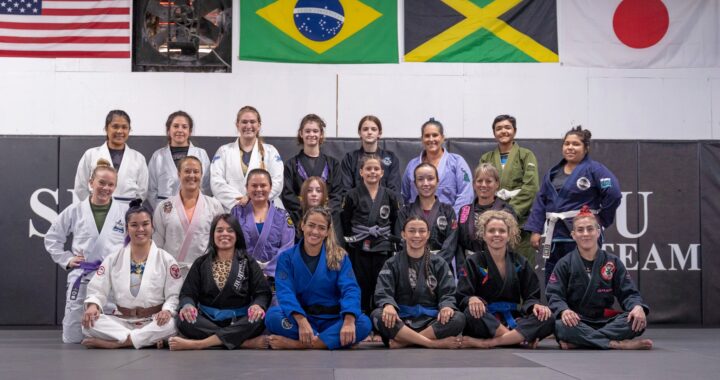 The Jiujiteira Sisterhood
The Jiujiteira Sisterhood  ADGS Rome: Jiujiteiras Shine in the Land of the Colosseum
ADGS Rome: Jiujiteiras Shine in the Land of the Colosseum 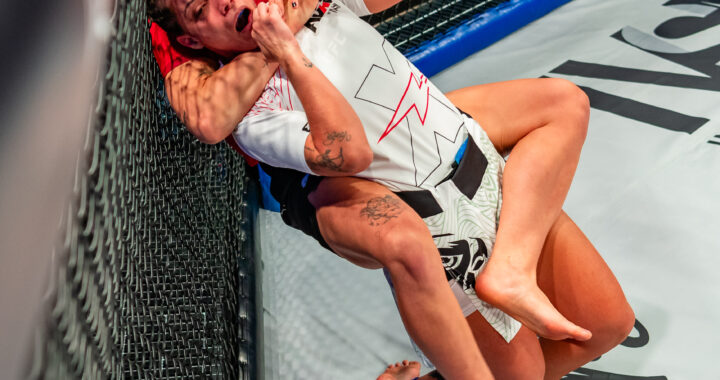 Ffion Davies: Unmatched Dominance at ADXC2
Ffion Davies: Unmatched Dominance at ADXC2 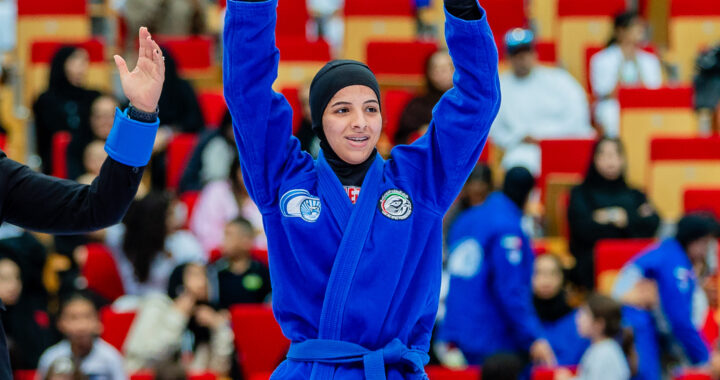 Winners of Mother of the Nation Jiu-Jitsu Cup are celebrated in Abu-Dhabi
Winners of Mother of the Nation Jiu-Jitsu Cup are celebrated in Abu-Dhabi 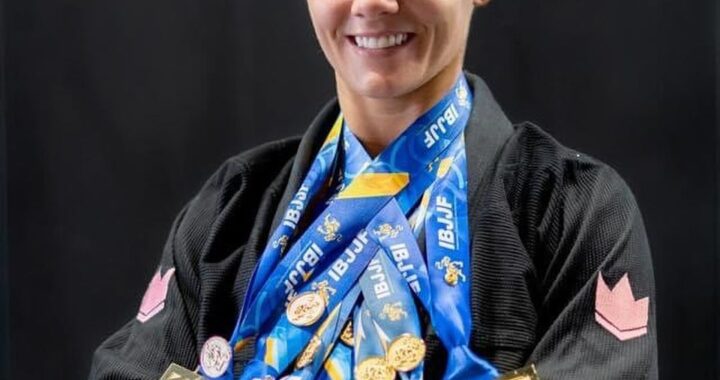 Maggie Grindatti Hangs Up the Gi: A Transition from BJJ Athlete to Fitness Coach
Maggie Grindatti Hangs Up the Gi: A Transition from BJJ Athlete to Fitness Coach 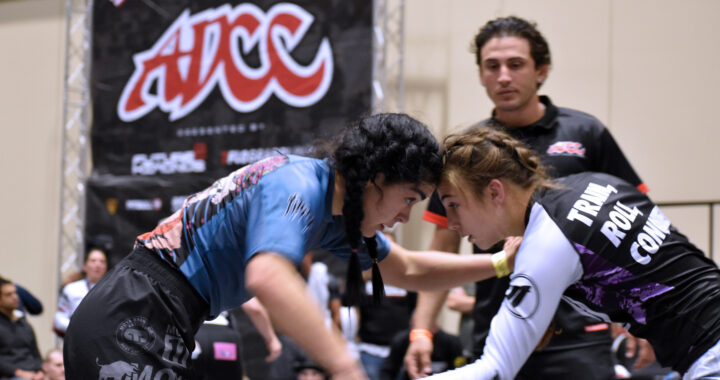 Jiujiteiras deliver intense battles and remarkable performances at ADCC Orlando Open
Jiujiteiras deliver intense battles and remarkable performances at ADCC Orlando Open 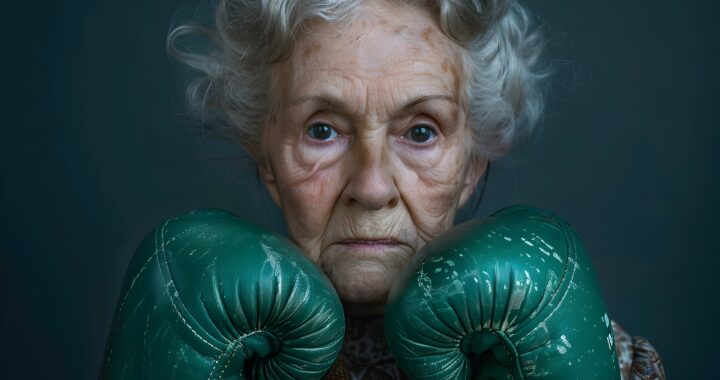 Father Time is Undefeated
Father Time is Undefeated 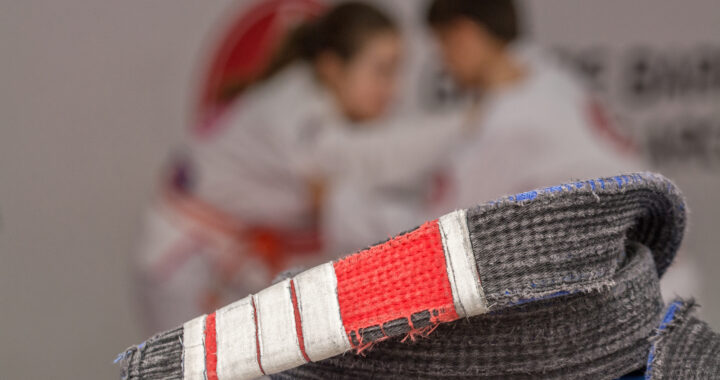 Advice in the Ranks- From White to Black
Advice in the Ranks- From White to Black